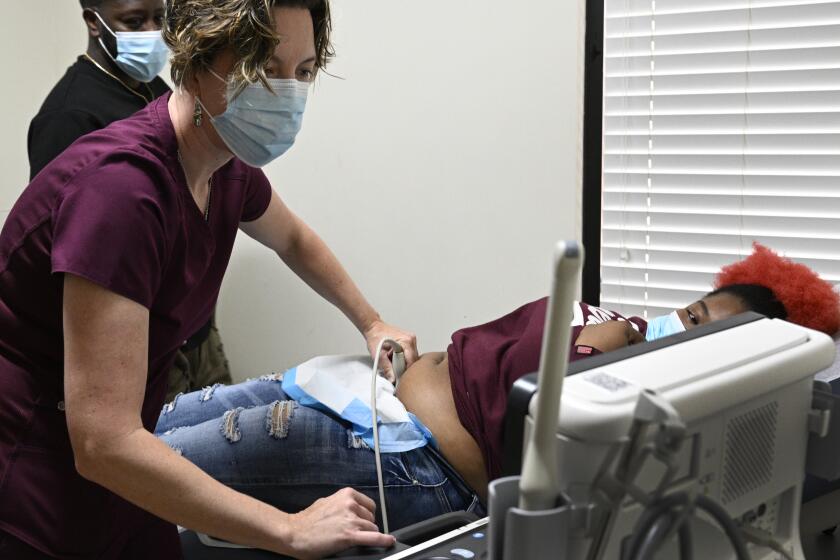Here are all the abortion debates happening this week in U.S. courts and statehouses

- Share via
Abortion opponents are trying again to implement restrictions in the latest round of court and legislative action on the divisive issue.
This round of efforts centers on states that have considered bans before and a policy that’s been bouncing around federal courts.
Here are key things to know about the latest developments in the saga of how abortion policy will settle after the U.S. Supreme Court last year overturned Roe vs. Wade and the nationwide right to abortion.
Purple state policy
Since the Dobbs ruling last year, tighter abortion restrictions have been enacted in most Republican-controlled states, while protections of abortion access have gone into effect in most that are dominated by Democrats.
Abortion pills: European doctor vows abortion bans or court rulings won’t stop her from getting medications to U.S. states including Texas, California.
But there hasn’t been such a uniform story in the 11 states with divided government control. Virginia has kept its status quo, for instance, while Vermont has adopted a constitutional amendment to preserve abortion access and Louisiana and Kentucky have bans in place.
Change came quickly in North Carolina in April when one state lawmaker flipped from Democrat to Republican, giving the GOP enough votes to override gubernatorial vetoes.
Lawmakers there promptly passed a ban that’s less restrictive than most — allowing abortion for the first 12 weeks of pregnancy, which would be among the least restrictive of the new bans. Democratic Gov. Roy Cooper vetoed it. But lawmakers on Tuesday overrode that veto and the new law is set to take effect July 1.
Trying again on bans in Nebraska, South Carolina
Nebraska and South Carolina are both Republican-dominated states where GOP lawmakers have struggled to agree on the details of abortion bans.
Both are considering bans this week, just weeks after earlier efforts narrowly fell short on procedural votes.
And both have resurrected legislation that’s less restrictive than versions that were rejected previously.
A former abortion clinic in Alabama evolves amid bans on caring for uninsured patients and offering post-miscarriage treatment and transgender care.
In South Carolina, Republican lawmakers were divided on whether to ban abortion at all stages of pregnancy or only after cardiac activity can be detected — generally around six weeks and often before women know they’re pregnant. A version of a less stringent ban is now under consideration.
In Nebraska, lawmakers balked at a ban after six weeks. The unique unicameral legislature is now considering a ban on abortion at 12 weeks’ gestation. It’s been added to a bill that would also ban gender-affirming care for minors.
Restriction in Montana
In Montana, Gov. Greg Gianforte signed a ban Tuesday on dilation and evacuation abortions, which are normally performed in the second trimester of pregnancy.
Planned Parenthood of Montana later the same day asked a state judge to temporarily block the law, arguing it is unconstitutional.
And it isn’t the first challenge to the policy in the state. A judge ruled last month that she would not block the ban preemptively, before it was signed into law.
The state in 2021 adopted a broader ban on abortions after 20 weeks of pregnancy, but the state Supreme Court ruled that it would not enforce it pending a court challenge, leaving abortions by some means legal until viability, around the 24th week.
Abortion pill ruling: A federal judge in Texas halts FDA’s approval of mifepristone, an abortion medication. But another judge contradicts the ruling.
Court arguments on abortion pill
Most of the legal battles on abortion since the Supreme Court’s Dobbs decision in 2022 have centered on whether individual state constitutions protect the right to abortion.
But one has implications nationally.
An anti-abortion group sued seeking to rescind the U.S. Food and Drug Administration’s 2000 approval of mifepristone, one of two drugs used in combination in most medication-induced abortions in the U.S.
A federal judge in Texas agreed. The New Orleans-based U.S. 5th Circuit Court of Appeals is hearing arguments Wednesday on the matter. In the meantime, the U.S. Supreme Court has said that mifepristone can remain on the market. It is already barred from being used in abortions, with some exceptions, in states with bans in place.
An immediate response from the circuit court is unlikely, and the case is expected to return to the nation’s top court eventually. The Texas-based case could be merged with one in Washington, where another federal judge ruled last month that mifepristone restrictions cannot be rolled back in a group of Democratic-led states that filed lawsuits.
More to Read
Sign up for Essential California
The most important California stories and recommendations in your inbox every morning.
You may occasionally receive promotional content from the Los Angeles Times.













